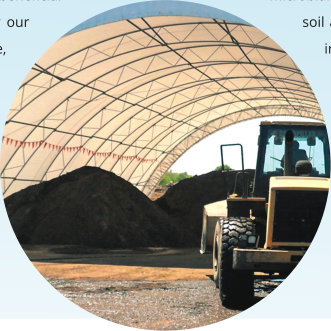
Creating a Healthy Biological System,
Your grandfather knew this all a long!Beneficial Microbes
are microscopic organisms such as bacteria and fungi that exists in our soil that: • decompose residues • store and cycle nutrients in the soil • build organic matter • build soil structure • work in tandem with the roots of plants to hold nutrients in the soil and then release them when needed • stimulate hormones • fix nitrogen and solubilize phosphates • they compete with disease organisms for food and space, or consume them, or induce systematic resistance to disease in plants
Improves the Life of the Soil
• Compost and compost tea bacteria break down organics into plant available nutrients. Some bacteria convert nitrogen from the air into a plant available nutrient; • Compost and compost tea enriched soil have lots of organisms that burrow through the soil keeping it well aerated; • Compost and compost tea increases may suppress diseases and harmful pests that could overrun poor, lifeless soil; • Healthy soil is an important factor in protecting our waters; • Compost and compost tea increases soil's ability to retain water and decreases runoff. Runoff pollutes water by carrying soil, fertilizers and pesticides to nearby streams; • Compost and compost tea encourages healthy root systems, which also decrease runoff; • Compost and compost tea can reduce or eliminate the use of synthetic fertilizers; • Compost and compost tea can reduce chemical pesticides since it contains beneficial micro- organisms that may protect plants from diseases and pests; • Only a 5% increase in organic material quadruples soils water holding capacity.Optimal Soil Structure
Optimal soil is full of tiny air channels and pores that hold air, moisture and nutrients. • Helps sandy soil retain water and nutrients; • Helps bind clusters of soil particles, called aggregates; • Compost loosens tightly bound particles in clay or silt, so roots can spread, water drain and air penetrates; • By altering soil structure, making it less likely to erode, and prevents soil splattering on plants - spreading disease; • Compost can hold nutrients tight enough to prevent them from washing out, but loose enough so plants can absorb them as needed; • Compost makes soil easier to work with.
Biology
will
determine
soil
quality.
It
is
therefore
important
to
understand
our
biological
friends
under
our
feet.
We
are
referring
to
the
microscopic
organisms,
called
Microbes.
There
are
an
enormously
wide
range
of
microbes,
that
can
exist
in
our
soil,
for
example,
Fungi,
nematodes,
protozoa,
nematodes, etc. that must be present in order to have healthy soil.
Selecting and Replenishing Beneficial Organisms
Compost
and
Compost
Tea
contain
high
levels
of
beneficial
organisms
that
your
soil
requires.
But
it
is
important
to
first
understand
what
type
of
beneficial
microbes
your
soil
or
crop
requires
by
conducting
some biological testing.
At
Northridge
Farms,
we
can
provide
you
with
a
variety
of
high
quality
organic
based
compost
and
compost
tea
that
you
as
a
grower
or
manager
need,
to
create
a
favourable
environment
for
beneficial organisms to thrive.
Many
of
today's
conventional
soil
management
practices
deplete
our
soil
of
nutrients
and
beneficial
microbial
life,
affecting
the
biological
process
or
our
soil
and
creating
imbalances
that
invite
disease,
insects and cause environmental problems such as ground water pollution and erosion.
Put back what You
take out!
FACTS



Soil Ecology and Productivity:
An
immense
diversity
of
microbes
inhabit
soil.
These
microbes
consist
of
bacteria,
fungi,
algae,
protozoa,
nematodes
and
other
micro-invertebrates.
The
majority
of
microbes
help
to
create
a
balanced
and
robust
environment
for
plant
growth
(productive
soil).
Productive
soils
require
less
nutrient
and
pesticide
additions
and
most
importantly,
less
water
than
conventionally
maintained
soil.
Bacteria:
Tens of thousands of species of bacteria inhabit just one-gram of productive soil. Bacteria are vital to the productivity of healthy soils. They aid in nutrient cycling, soil building, degrading organic residues, disease suppression and are food sources for other microbes.Fungi:
Perhaps the least understood and most under appreciated members of the soil community. There are thousands of species in one gram of productive soil. Fungi are extremely important in binding and releasing P-complexes, Ca-complexes and creating stable/arable soil aggregates. They are the "superhighways" of the soil.Protozoa:
The mineralizers. Protozoa consume large numbers of bacteria and other microbes releasing many vital nutrients via excretion into the surrounding soil. One ciliate can consume 30 bacteria per hour and only require 1/6 of the total nitrogen mineralized.Nematodes:
The most numerous animal on the planet and perhaps the most poorly understood. Most nematodes are beneficial - feeding on bacteria, fungi and other soil microbes. Some are pathogenic - feeding on plant roots (hence the bad reputation). Healthy soils contain only a few root feeding nematodes. Micro-arthropods:: Shredders and grinders mobilize organic matter into forms more usable by other microbes. Micro-arthropods are extremely important in nutrient cycling, disease prevention and maintaining a healthy productive soil. Keys to Maintaining Productive Soils: • Addition of humified organic matter (compost, green manure) • Reduction in chemical applications (nutrients and pesticides) • Inoculating plants and soil with beneficial microbes • Education - working to further understand how biology works chemistry in plant growing systems to optimize productivity and sustainability
ADDRESS
LOCATION
CONTACT
FACILITY HOURS
During the months
May & June
Open on Saturday
9.00 am - 12.00 noon
It is just not possible to rate Compost Tea or Compost in terms of
NPK.
The
traditional
NPK
rating
system
describes
the
solubility
of
a
synthetic
fertilizer.
Synthetic
nutrients
are
readily
available
to
the
plant
roots
for
absorption.
However,
the
plant
might
not
be
in
a
need
for
that
particular
nutrient
as
the
time.
As
synthetic
nutrients
do
not
remain
in
the
soil
very
long,
they
might
not
be
available
when
needed
due
to
heavy
watering
or
rainfall.
What is the NPK rate
•
Nitrogen,
•
Phosphorous,
•
Potassium
for Compost or Compost Tea?

Biology
will
determine
soil
quality.
It
is
therefore
important
to
understand
our
biological
friends
under
our
feet.
We
are
referring
to
the
microscopic
organisms,
called
Microbes.
There
are
an
enormously
wide
range
of
microbes,
that
can
exist
in
our
soil,
for
example,
Fungi,
nematodes,
protozoa,
nematodes,
etc.
that must be present in order to have healthy soil.
Selecting and Replenishing
Beneficial Organisms
Compost
and
Compost
Tea
contain
high
levels
of
beneficial
organisms
that
your
soil
requires.
But
it
is
important
to
first
understand
what
type
of
beneficial
microbes
your
soil
or
crop
requires
by
conducting
some biological testing.
At
Northridge
Farms,
we
can
provide
you
with
a
variety
of
high
quality
organic
based
compost
and
compost
tea
that
you
as
a
grower
or
manager
need,
to
create
a
favourable
environment
for
beneficial
organisms to thrive.
Many
of
today's
conventional
soil
management
practices
deplete
our
soil
of
nutrients
and
beneficial
microbial
life,
affecting
the
biological
process
or
our
soil
and
creating
imbalances
that
invite
disease,
insects
and
cause
environmental
problems
such
as
ground water pollution and erosion.

What is the NPK rate
•
Nitrogen,
•
Phosphorous,
•
Potassium
for Compost or Compost Tea?



Creating a Healthy Biological
System,
Your grandfather knew this all a long!FACTS

It
is
just
not
possible
to
rate
Compost
Tea
or
Compost
in terms of
NPK.
The
traditional
NPK
rating
system
describes
the
solubility
of
a
synthetic
fertilizer.
Synthetic
nutrients
are
readily
available
to
the
plant
roots
for
absorption.
However,
the
plant
might
not
be
in
a
need
for
that
particular
nutrient
as
the
time.
As
synthetic
nutrients
do
not
remain
in
the
soil
very
long,
they
might
not
be
available
when
needed
due
to
heavy
watering
or
rainfall.
Put back what You
take out
ADDRESS
LOCATION
CONTACT
FACILITY HOURS
During the months
May & June
Open on Saturday
9.00 am - 12.00 noon
Soil Ecology and Productivity:
An
immense
diversity
of
microbes
inhabit
soil.
These
microbes
consist
of
bacteria,
fungi,
algae,
protozoa,
nematodes
and
other
micro-invertebrates.
The
majority
of
microbes
help
to
create
a
balanced
and
robust
environment
for
plant
growth
(productive
soil).
Productive
soils
require
less
nutrient
and
pesticide
additions
and
most
importantly,
less
water
than
conventionally maintained soil.
Bacteria:
Tens of thousands of species of bacteria inhabit just one-gram of productive soil. Bacteria are vital to the productivity of healthy soils. They aid in nutrient cycling, soil building, degrading organic residues, disease suppression and are food sources for other microbes.Fungi:
Perhaps the least understood and most under appreciated members of the soil community. There are thousands of species in one gram of productive soil. Fungi are extremely important in binding and releasing P-complexes, Ca-complexes and creating stable/arable soil aggregates. They are the "superhighways" of the soil.Protozoa:
The mineralizers. Protozoa consume large numbers of bacteria and other microbes releasing many vital nutrients via excretion into the surrounding soil. One ciliate can consume 30 bacteria per hour and only require 1/6 of the total nitrogen mineralized.Nematodes:
The most numerous animal on the planet and perhaps the most poorly understood. Most nematodes are beneficial - feeding on bacteria, fungi and other soil microbes. Some are pathogenic - feeding on plant roots (hence the bad reputation). Healthy soils contain only a few root feeding nematodes. Micro-arthropods:: Shredders and grinders mobilize organic matter into forms more usable by other microbes. Micro-arthropods are extremely important in nutrient cycling, disease prevention and maintaining a healthy productive soil. Keys to Maintaining Productive Soils: • Addition of humified organic matter (compost, green manure) • Reduction in chemical applications (nutrients and pesticides) • Inoculating plants and soil with beneficial microbes • Education - working to further understand how biology works chemistry in plant growing systems to optimize productivity and sustainability
Creating a Healthy Biological System,
Your grandfather knew this all a long!Beneficial Microbes
are microscopic organisms such as bacteria and fungi that exists in our soil that: • decompose residues • store and cycle nutrients in the soil • build organic matter • build soil structure • work in tandem with the roots of plants to hold nutrients in the soil and then release them when needed • stimulate hormones • fix nitrogen and solubilize phosphates • they compete with disease organisms for food and space, or consume them, or induce systematic resistance to disease in plants
Improves the Life of the Soil
• Compost and compost tea bacteria break down organics into plant available nutrients. Some bacteria convert nitrogen from the air into a plant available nutrient; • Compost and compost tea enriched soil have lots of organisms that burrow through the soil keeping it well aerated; • Compost and compost tea increases may suppress diseases and harmful pests that could overrun poor, lifeless soil; • Healthy soil is an important factor in protecting our waters; • Compost and compost tea increases soil's ability to retain water and decreases runoff. Runoff pollutes water by carrying soil, fertilizers and pesticides to nearby streams; • Compost and compost tea encourages healthy root systems, which also decrease runoff; • Compost and compost tea can reduce or eliminate the use of synthetic fertilizers; • Compost and compost tea can reduce chemical pesticides since it contains beneficial micro- organisms that may protect plants from diseases and pests; • Only a 5% increase in organic material quadruples soils water holding capacity.Optimal Soil Structure
Optimal soil is full of tiny air channels and pores that hold air, moisture and nutrients. • Helps sandy soil retain water and nutrients; • Helps bind clusters of soil particles, called aggregates; • Compost loosens tightly bound particles in clay or silt, so roots can spread, water drain and air penetrates; • By altering soil structure, making it less likely to erode, and prevents soil splattering on plants - spreading disease; • Compost can hold nutrients tight enough to prevent them from washing out, but loose enough so plants can absorb them as needed; • Compost makes soil easier to work with.
Biology
will
determine
soil
quality.
It
is
therefore
important
to
understand
our
biological
friends
under
our
feet.
We
are
referring
to
the
microscopic
organisms,
called
Microbes.
There
are
an
enormously
wide
range
of
microbes,
that
can
exist
in
our
soil,
for
example,
Fungi,
nematodes,
protozoa, nematodes, etc. that must be present in order to have healthy soil.
Selecting and Replenishing Beneficial Organisms
Compost
and
Compost
Tea
contain
high
levels
of
beneficial
organisms
that
your
soil
requires.
But
it
is
important
to
first
understand
what
type
of
beneficial
microbes
your
soil
or
crop
requires
by conducting some biological testing.
At
Northridge
Farms,
we
can
provide
you
with
a
variety
of
high
quality
organic
based
compost
and
compost
tea
that
you
as
a
grower
or
manager
need,
to
create
a
favourable
environment
for
beneficial organisms to thrive.
Many
of
today's
conventional
soil
management
practices
deplete
our
soil
of
nutrients
and
beneficial
microbial
life,
affecting
the
biological
process
or
our
soil
and
creating
imbalances
that
invite
disease,
insects
and
cause
e
n
v
i
r
o
n
m
e
n
t
a
l
problems
such
as
ground
water
pollution
and
erosion.
Put back what You
take out!
FACTS



Soil Ecology and Productivity:
An
immense
diversity
of
microbes
inhabit
soil.
These
microbes
consist
of
bacteria,
fungi,
algae,
protozoa,
nematodes
and
other
micro-invertebrates.
The
majority
of
microbes
help
to
create
a
balanced
and
robust
environment
for
plant
growth
(productive
soil).
Productive
soils
require
less
nutrient
and
pesticide
additions
and
most
importantly,
less
water
than
conventionally maintained soil.
Bacteria:
Tens of thousands of species of bacteria inhabit just one-gram of productive soil. Bacteria are vital to the productivity of healthy soils. They aid in nutrient cycling, soil building, degrading organic residues, disease suppression and are food sources for other microbes.Fungi:
Perhaps the least understood and most under appreciated members of the soil community. There are thousands of species in one gram of productive soil. Fungi are extremely important in binding and releasing P-complexes, Ca-complexes and creating stable/arable soil aggregates. They are the "superhighways" of the soil.Protozoa:
The mineralizers. Protozoa consume large numbers of bacteria and other microbes releasing many vital nutrients via excretion into the surrounding soil. One ciliate can consume 30 bacteria per hour and only require 1/6 of the total nitrogen mineralized.Nematodes:
The most numerous animal on the planet and perhaps the most poorly understood. Most nematodes are beneficial - feeding on bacteria, fungi and other soil microbes. Some are pathogenic - feeding on plant roots (hence the bad reputation). Healthy soils contain only a few root feeding nematodes. Micro-arthropods:: Shredders and grinders mobilize organic matter into forms more usable by other microbes. Micro-arthropods are extremely important in nutrient cycling, disease prevention and maintaining a healthy productive soil. Keys to Maintaining Productive Soils: • Addition of humified organic matter (compost, green manure) • Reduction in chemical applications (nutrients and pesticides) • Inoculating plants and soil with beneficial microbes • Education - working to further understand how biology works chemistry in plant growing systems to optimize productivity and sustainability
ADDRESS
LOCATION
CONTACT
FACILITY HOURS
During the months
May & June
Open on Saturday
9.00 am - 12.00 noon
It
is
just
not
possible
to
rate
Compost
Tea
or
Compost in terms of
NPK.
The
traditional
NPK
rating
system
describes
the
solubility
of
a
synthetic
fertilizer.
Synthetic
nutrients
are
readily
available
to
the
plant
roots
for
absorption.
However,
the
plant
might
not
be
in
a
need
for
that
particular
nutrient
as
the
time.
As
synthetic
nutrients
do
not
remain
in
the
soil
very
long,
they
might
not
be
available
when
needed
due
to
heavy
watering or rainfall.
What is the NPK rate
•
Nitrogen,
•
Phosphorous,
•
Potassium
for Compost or Compost Tea?




















